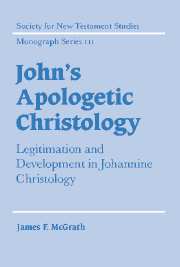Book contents
- Frontmatter
- Contents
- Preface
- Part 1 Introduction
- Part 2 Jesus and God
- 3 Are there ‘two powers’ in John?
- 4 God's equal or God's agent? (John 5)
- 5 ‘I obey, therefore “I am”’ (John 8.12 – 59)
- 6 ‘You are gods’ – but who are ‘you’? (John 10.22 – 39)
- 7 In the bosom of the Father (John 1.1 – 18)
- 8 Conclusion to part 2
- Part 3 Jesus, Moses and Torah
- Part 4 Other issues and conclusion
- 16 Conclusion
- Bibliography
- Index of biblical references
- Index of authors
- Index of subjects
6 - ‘You are gods’ – but who are ‘you’? (John 10.22 – 39)
Published online by Cambridge University Press: 22 September 2009
- Frontmatter
- Contents
- Preface
- Part 1 Introduction
- Part 2 Jesus and God
- 3 Are there ‘two powers’ in John?
- 4 God's equal or God's agent? (John 5)
- 5 ‘I obey, therefore “I am”’ (John 8.12 – 59)
- 6 ‘You are gods’ – but who are ‘you’? (John 10.22 – 39)
- 7 In the bosom of the Father (John 1.1 – 18)
- 8 Conclusion to part 2
- Part 3 Jesus, Moses and Torah
- Part 4 Other issues and conclusion
- 16 Conclusion
- Bibliography
- Index of biblical references
- Index of authors
- Index of subjects
Summary
We shall now turn our attention to John 10. In this part of the Fourth Gospel we have a clear example of an apologetic appeal to Scripture in support of the christological claims made by the Johannine Jesus. Neyrey rightly classes verses 34–6 and verses 37–8 as apologies, and Becker expresses a similar view in relation to the whole of 10.22–5, 30–9.3 There can be little doubt that the Fourth Evangelist is here responding to the objections brought by ‘the Jews’, and seeking thereby to defend or legitimate the beliefs that have come under fire.
The subject of the conflict and its relationship to earlier christological beliefs
The issue which is raised explicitly in this chapter is that Jesus, a ‘mere human,’ is ‘making himself God,’ and thus committing ‘blasphemy.’ As Talbert has noted, many aspects of this passage closely resemble the main elements of the dialogue with the Jews in John 5:
Jesus claims a functional unity with the Father. The Son does what the Father does (5.17, 19–21; 10.25–30, 37–8).
‘The Jews’ misunderstand this in terms of Jesus making himself, as Son, equal to or identical with the Father (5.18; 10.33).
As a direct consequence, ‘the Jews’ seek to kill Jesus (5.18; 10.31).
An apologetic response is given, which appeals to Scripture as a support for the claims and actions of Jesus (5.39–40, 46–7; 10.34–5).
- Type
- Chapter
- Information
- John's Apologetic ChristologyLegitimation and Development in Johannine Christology, pp. 117 - 130Publisher: Cambridge University PressPrint publication year: 2001



